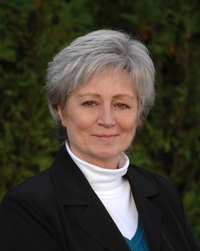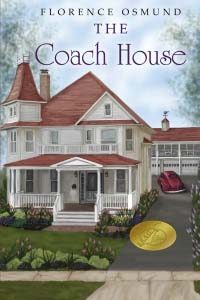 Contributed by Florence Osmund
Contributed by Florence Osmund
As an aspiring author anxious to get published, you may be tempted to plunge into the profession by first writing a book. That seems logical, but there’s this thing called author platform to consider that can affect your standing as an author, and the best time to start building one is before you start writing.
An author platform is a continual plan of action that conveys your expertise and credibility to others and is essential in building a successful writing career. Platform is your visibility so that others know who you are and how to find you and your books.



Think of building a career as an author like building a house. The first thing you need to do is start laying a foundation—a platform for you to sell your book. Just like a house, your writing career needs a solid foundation in order to last long-term. Without it, your career could become shaky or tumble altogether.
Some people have built-in platforms—celebrities, politicians, sports figures, wives of celebrities, wives of politicians (I think you get the picture). If you are one of these people, you can stop reading now. But if you’re just an ordinary person like I am, continue reading to learn how to build an effective author platform.
It’s Like Any Other Industry
Building a career as an author is no different than building a career in banking, politics, hotel management, or any other occupation. It’s a gradual evolving process that involves education, experience, and hard work.
The last position I held prior to writing novels was that of Regional Director of Administration for a $75 billion company. It took years to attain a position at that level—years of acquiring expertise, fostering relationships, and establishing a credible reputation—years of building an effective platform. Building an author platform is no different.
According to Amazon’s website, they offer for sale more than twenty million books (and that’s just the number written in English) with more than two million in the “literature & fiction” category. Let’s say you write romance novels. On Amazon, you’re competing against more than twenty-one thousand other books. An effective platform will help to get your book noticed in the vast sea of competition.
One Size Does Not Fit All
If I could, I would list all the things you need to do in order to develop an effective platform for yourself, but platforms are not “one size fits all.” Platforms depend on your niche, target audience, strengths, and personal goals. An effective platform will be unique to you and will showcase what sets you apart from your competitors.
Building your author platform is an ongoing process, and the amount of effort you put into it will affect the success of your book. Consider the following determining factors.
Credibility and Validity
The first step to gaining credibility as an author is to create a good product—all the marketing in the world will not sell a poorly written book. (Okay, so there have been some exceptions, but they are rare, so don’t count on it.) If you’re serious about your writing career, you will hire a professional editor. Editors help you shape your manuscript into one that is clear, credible, and marketable. If you can’t afford to hire an editor, at least hire a professional proofreader to ensure there are no blatant errors or typos.
Other ways to validate your skills and abilities are to write articles, enter (and hopefully win) contests, accept speaking engagements, and seek out reviews of your work. When you accomplish something that adds to your credibility as an author, don’t be shy—proclaim it.
In addition to the indieBRAG organization, I am aware of two others that will review your book for little or no fee, and if it passes their proprietary set of standards, they will give it their seal of approval. Being honored in this way adds to your credibility as an author and your book’s value.
www.BRAGMedallion.com for their B.R.A.G. Medallion
www.awesomeindies.net for their Seal of Approval
www.indiePENdents.org for their IndiePENdents Seal
Exposure and Visibility
Exposure is critical for authors—it’s important to take advantage of every opportunity you can to promote your book. Just be careful to avoid being perceived as a hard-core salesman—the hard-sell approach may work for some products, but generally not books, especially novels.
Social media is an excellent stage for exposure. Create a Facebook author page to promote yourself and your books. Open a Twitter account and “follow” known readers, bloggers, and people in the publishing industry. Most of them will “follow” you back. Retweet and comment on interesting posts.
Participate in on-line interviews. Seek out speaking engagements. Take full advantage of your Amazon author page. And don’t forget good old-fashioned word-of-mouth advertising—it still works.
Meaningful Contacts
One way to make meaningful contacts is by participating in on-line discussion groups. LinkedIn, Goodreads, Google+, and Facebook each have groups you can join to connect with other people with common interests. Join in to learn from them and also to share what you know.
Attend local industry-related meetings. Chicago has The Chicago Self-Publishing Group, Chicago Women in Publishing, Independent Writers of Chicago, and Chicago Writer’s Association to name a few. The website www.meetup.com is a good place to find groups in your area. Book conferences and fairs are also excellent places to make meaningful connections.
Target Audience
Not everyone is going to want to read your book (a disheartening but verifiable truth), so don’t try to create one that will appeal to the masses. If you do, your book will risk not finding its niche, will likely get lost in a deluge of other books competing for the same readers.
Unfortunately for fiction writers, it’s not that easy to isolate the readers who will find your book appealing, especially for those who write in broad-based genres such as mainstream fiction. But you can start by identifying your ideal readers by their age group, gender, geographic location, and special interests. For example, if the main character in your book meets the love of her life on a ski slope, a potential reader may be a single twenty to thirty-year-old female who likes to ski or lives near a ski resort. Determine where people in this demographic congregate, what magazines they read, what meetings they attend. Become visible in their community. Pitch to them on social media. Check out advertising in the blogs, magazines, and newsletters they read. Use the same keywords in your book description that they might use when searching for a book online.
Social media can be such a useful tool. The advanced search feature on Twitter allows you to find out who’s talking about subjects that are relevant to your book. Facebook gathers a huge amount of data on its users (click on the New Page Insights tab) that you can use to access information about the people who have “liked” and “followed” you. Use that information to your advantage.
Once you know your target audience, you can spend your efforts selling to them instead of wasting your time and money on someone who isn’t likely to buy your book anyway.
Fan Base
Fans will help you sell books, and an easy way to manage a fan base is by maintaining an e-mail subscriber list. In exchange for their e-mail address, invite people to sign up for something relevant and worthwhile—free advice, a free e-book, a chance to win something. Be creative. Have fun with it.
I have two e-mail subscriber lists—one for people to be notified of my new book releases and one to be notified of new information I have added to the website I developed for new and aspiring writers. It has taken two and a half years to build a modest fan base of 300+ subscribers on each list. What I like about this is that they are on the list because they requested to be on it, and that makes them true fans. True fans have value.
Once you have a fan base established, you can poll them as to what they look for in a book and the manner in which they find books and then use this feedback in your own writing and marketing efforts.
More on Author Platform
I hope I have given you some useful ideas for building an author platform. Here are some other articles that address this topic.
- http://janefriedman.com/2012/03/13/author-platform-definition/
- http://www.writersdigest.com/writing-articles/by-writing-goal/get-published-sell-my-work/how-to-build-your-author-platform
- http://blog.bookbaby.com/2013/01/building-your-author-platform-in-10-hours-a-week/
- http://www.yourwriterplatform.com/actions-to-build-writer-platform/
About the Author
After a long career in corporate America, Florence Osmund retired to write novels. “I strive to write literary fiction and endeavor to craft stories that challenge readers to survey their own beliefs and values,” Osmund states. Florence’s website www.novelelements.com offers substantial advice for new and aspiring writers including how to begin the project, writing techniques, building an author platform, book promotion, and more. Florence lives in the heart of Chicago on the shore of Lake Michigan where she continues to write novels.
Contact and Social Media Links:
- E-mail: mailto:info@florenceosmund.com
- Amazon author page: amzn.to/1IWdw1m
- Author Website: www.novelelements.com
- Book website: www.florenceosmundbooks.com
- Facebook: www.facebook.com/FlorenceOsmundBooks
- Twitter: www.twitter.com/FlorenceOsmund
- LinkedIn: www.linkedin.com/in/florenceosmund
- Goodreads: www.goodreads.com/user/show/8800692-florence-osmund
- Pinterest: www.pinterest.com/florenceosmund/
Leave a Reply